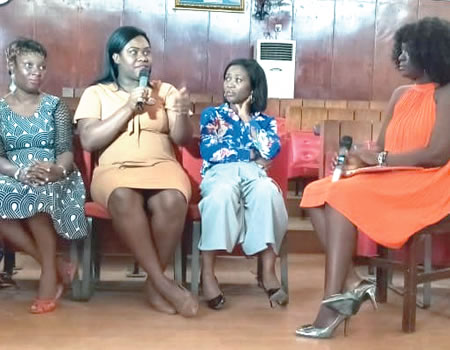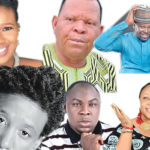According to the United Nations Children’s Fund (UNICEF), in May 2018, two sisters, six and eight years old, were sexual assaulted by a man in their community in Plateau State. Though the man was arrested and the sisters received help, the sisters are still struggling to get justice, and their lives would probably not remain the same.
Sadly, in virtually every community and state in the country, there are people like these sisters in Plateau. Unfortunately, most victims of sexual violence and their families do not report these incidents because of fear, stigma, among others. And, the ones that actually report, only 3.5 per cent of them receive any form of support.
Two Saturdays ago, inside the board room of the University of Ibadan Hotel, some people gathered to share and discuss similar stories. The event, which was convened by Jesudunsin Okewumi, under the auspice of her non-governmental organisation (NGO), The Hug Place, with the theme ‘OYO SARC: Towards Rehabilitation of sexual violence survivors’, was a conference meant to address some of these issues. The conference featured storytelling, panel discussion and town hall meeting.
According to Okewumi, who is a safe space and trauma recovery advocate, the conference was aimed at creating public awareness on gender-based violence, especially sexual violence and their survivors, and the urgent need to provide a safe space and referral centre for them.
“We want to start a conversation with communities and government as regards the need to establish a referral centre for sexual-violence survivors in our society,” she said. “This proposed centre will provide professional medical, forensic, legal and psychological services for survivors of gender-based violence to enhance their recovery and rehabilitation.”
After the storytelling session—during which some people in the audience narrated personal stories and stories of other people who have experience sexual violence—the panel discussion session began.
The panel was moderated by Omeghie Okomoyoh, a public speaker and a development communicator. The panellist included Wuraoluwa Ayodele, a lawyer and the founder of Women Safe House Sustenance initiative; Dr Adetoun Faloye, a mental health advocate, a psychiatrist and a senior registrar at the Department of Psychiatry of University College Hospital, Ibadan; and Ronke Giwa-Onofuwa, a broadcaster with Splash FM and the convener of TalkMummy.
Okomoyoh, while questioning and engaging the panellist took advantage of their profession, gender and more importantly their work and experience in the area sexual violence and other related matters. She sought the panellists suggestions on how the blueprint of the proposed sexual assault referral centre should look like, and its likely impact to the individual and the society.
“We’ve a doctor, a lawyer and a broadcaster on this panel,” she began the panel session that lasted for over forty minutes. “So, what would you say is the most difficult challenge we face in dealing with sexual assault violence in the country?”
“Belief,” Ayodele began. She stressed that most people, including their family and the police, do not believe sexual assault victims when they report such cases. She noted that immediate response and help to the victims are important, because it would help their recovery and in bringing the perpetrators to justice. She also noted that there is a sexual violence related law of 2016 in Oyo State, and that many people are not aware of this law.
“The centre will bring this law into limelight and make people understand that there’s a provision that covers sexual violence cases,” she said. “The centre will also provide a safe place and immediate intervention that sexual assault victims need, like legal aid, medical and mental treatments. The centre will relief them. Sometimes, that’s all they need—that validation, that believe and a safe centre.”
While Faloye agreed with Ayodele on her ‘belief’ stance, she noted that culture plays a role in the way people perceive and judge sexually assaulted victims. She talked about the long and short term mental effect of gender-based violence. She stated that though many professionals are involve in sexual violence matters, such as doctors, lawyers, social workers, teachers, among others, there should be a collaborative effort among these professionals for there to be meaningful results.
On the referral centre, she advocated that the centre should adopt a holistic approach in handling sexual violence, stressing that it is not only the victims that are affected, but also their families. “In some cases, the family of the victim is more pained and aggravated than the victim. So, the centre should look beyond the individual victim. It should provide psychological and mental support for everybody involved.”
Giwa-Onofuwa began by stating that lack of trust and stigma towards rape victims are the major challenges in addressing issues related to sexual assault or violence. She emphasised that anger towards this kind of violence is one of the ways people could key into the fight against these societal ills and address it. “If we see or hear cases like this, we shouldn’t be happy about it. We shouldn’t condemn it. We should be angry about it. We should speak against it and report it.”
About how the proposed sexual assault referral centre should work, she said the centre would be a safe space where the victims and the survivors of sexual violence could be properly taken care of. “This should be a place where their confidence and self-esteem would be restored again, where they would be assured that what happened is not the end of the world.”
Sunday Nyemeabasi, from the Oyo State Ministry of Health, commended the organisers of the event for their efforts in addressing these kinds of issues. On the other hand, he noted that their line of work is a broad area and a lot of work and research have been done on them, and that what would give them an edge in selling their idea to the government for setting up a sexual assault referral centre is the way they package it and the way they lobby for its approval and implementation.
“I’ll encourage you to also seek grants and funding, which will help you to achieve your mission,” he said. “I’ll also encourage you to organise seminars and workshops as regards this issue. This’s not just a sexual issue. It’s also an economic issue. You can train teachers, lawyers, farmers, health workers, lecturers, everybody.”
Akah Peter, with the National Human Rights Commission (NHRC), noted that the issues discussed are human rights issues and that 90 per cent of them are political. He stressed that the problem is that most people do not believe they are part of politics, adding that the main reason people fail to approach the courts as regards issues like this is because they feel the judiciary and the police are compromised, that every part of government is not working, and that only the politicians could rectify these problems.
“The National Human Rights Commission is not an NGO, and we encourage people to take advantage of the commission in Oyo State,” he said. “So, as NGOs, when issues like this come up, reach out to us. The commission will provide an umbrella for every person. Issues like this are not hopeless situations. When someone gets justice, it goes a long way to mitigate their pain.”
Many cases of sexual violence across Nigeria were cited in the event. There was a case in Port Harcourt where the ward of a primary caregiver raped a three-year-old under her care. There was a case in Ibadan where a ten-year-old girl has been raped two times within ten months. There was a case in Ibadan where a lady who recently finished youth services was raped. There another case where a pastor raped a girl and her mother refused to report the matter. The cases were numerous to mention.
Some people in the audience shared their views on the issues discussed. A woman noted that most of these sexual assaults happen in rural areas, and that the best places to reach out to these people, especially children, are in public schools. A man also noted that sexual violence occurs mostly in villages and that it is the same village sexual perpetrators or survivors that would migrate to urban areas, stressing that sexual violence is an issue everybody should be interested in. Oluwaseun Folajuwon-Banjo, the founder of Savingcross Justicepoint Foundation, narrated stories of how her organisation has helped indigent people, especially indigent female inmates as regards some of the issues discussed.
Jesudunsin Okewumi, while giving the closing remarks, emphasised that the end of the conference is not the end of the issues discussed or the end of the sexual referral centre crusade and project. “There’s a lot to be done, going on. We need grants and funding. We need volunteers and collaboration from the government. We need government to take drastic measures on gender-based violence and on penalisation of their perpetrators. We need Oyo government to establish a sexual assault referral centre in each location across the state.”
WATCH TOP VIDEOS FROM NIGERIAN TRIBUNE TV
- Let’s Talk About SELF-AWARENESS
- Is Your Confidence Mistaken for Pride? Let’s talk about it
- Is Etiquette About Perfection…Or Just Not Being Rude?
- Top Psychologist Reveal 3 Signs You’re Struggling With Imposter Syndrome
- Do You Pick Up Work-Related Calls at Midnight or Never? Let’s Talk About Boundaries







